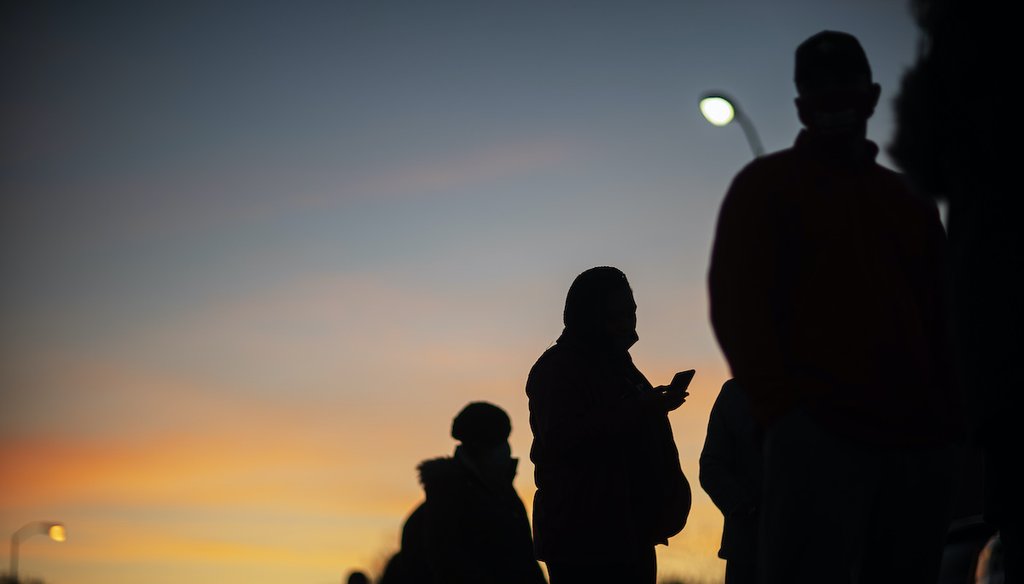

Our only agenda is to publish the truth so you can be an informed participant in democracy.
We need your help.


Voters line up before polls open on Election Day at a precinct in Warren, Mich., Tuesday, Nov. 3, 2020. (AP)
A study by the Poor People’s Campaign found that about 35% of the 2020 presidential electorate had household incomes below $50,000.
The Gateway Pundit used the study to falsely claim that Democrats used low-income voters to steal the election.
There was no evidence of fraud that would have changed the outcome of the presidential election.
Donald Trump’s allies have floated all sorts of wild theories to argue that Democrats stole the 2020 presidential election. One right-wing website is now citing a study of low-income voters to claim that it explains how Democrats purportedly pulled off their caper.
But the website’s statements are bogus.
"Democrats reveal big clue in the big steal: operatives manufactured votes from low income voters to steal the battleground states," says the headline on an Oct. 17 Facebook post by the Gateway Pundit. "Start the canvassing!"
The article under the headline highlights a Huffington Post report about a study of low-income voters in the 2020 presidential election. The article invites Trump supporters to use this information to discover "the fraud" and canvass "lower-income citizens who reportedly voted in 2020."
The study about low-income voters is real. But the conclusion that Democrats admitted to using low-income voters to steal the election in favor of Joe Biden is false. Low-income people are allowed to vote, after all. And the Gateway Pundit failed to recognize the difference between voter outreach and voter fraud.
The post was flagged as part of Facebook’s efforts to combat false news and misinformation on its News Feed. (Read more about our partnership with Facebook.)
The study cited by the Gateway Pundit and the Huffington Post was by the Poor People’s Campaign. The group, formed in recent years, was modeled after Martin Luther King Jr.’s campaign to mobilize poor people for political change. The group is nonpartisan, but many of the policies it advocates align with goals on the left, such as expanding voting rights and raising the minimum wage.
In the final months of the 2020 election, the group reached out to about 2 million low-income voters in multiple states with a history of low voter participation to encourage them to vote. The study defined low-income voters as those with an annual household income of less than $50,000.
The study concluded that 35% of the voting electorate who cast ballots were low-income voters, and that percentage rose in some battleground states.
"This cuts against common misperceptions that poor and low-income people are apathetic about politics or inconsequential to electoral outcomes," the study stated.
The Huffington Post cited the study to assert that low-income voters were the key to Biden’s victory, though the study didn’t state that.
"We cannot use the numbers to say that low-income voters were the decisive factor in the election outcome," Shailly Gupta Barnes, author of the study, told PolitiFact in an email. "However, given the small margins of victory in multiple states, their sheer size and vote share indicate the potential that the low-income electorate can have on election outcomes if more directly engaged."
The Gateway Pundit made a more far-reaching conclusion: that Democrats used low-income voters to steal the election, although nothing in the study backs that up. One hole in that argument: The study shows that the battleground state with the highest share of low-income voters, Florida, went for Trump.
Other research suggests that low-income voters played a smaller role in 2020 than in 2016. The Pew Research Center, which studied the characteristics of the 2020 electorate, found that "as in 2016, voters in 2020 had higher incomes" than nonvoters. Pew found that 35% of voters had family incomes of less than $50,000 in 2020, a drop from 2016 when 48% of voters had family incomes of less than $50,000.
RELATED VIDEO
We have previously debunked various false claims by Trump and his allies that the election was rigged or stolen by the Democrats.
Federal officials in Trump’s administration said the November election was secure, and judges nationwide, including GOP appointees, rejected dozens of lawsuits alleging wrongdoing. Evidence of voter fraud in the 2020 election was statistically rare among the more than 160 million votes cast.
The Gateway Pundit, citing a study by the Poor People’s Campaign, said Democrats "manufactured votes from low income voters to steal the battleground states."
There’s nothing in the study to support that. The study was about the impact of a voter outreach effort focused on low-income people.
Poor people are allowed to vote, and voter outreach is not voter fraud.
We rate this statement Pants on Fire.
Gateway Pundit, Democrats Reveal BIG CLUE in the BIG STEAL: Operatives Manufactured Votes from Low Income Voters to Steal the Battleground States — Start the Canvassing! Oct. 17, 2021
Poor People’s Campaign, Waking the Sleeping Giant: Poor and Low-Income Voters in the 2020 Elections, October 2021
Pew Research Center, Behind Biden’s 2020 Victory, June 30, 2021
Arizona Mirror, Low-income voters cast nearly 44% of all Arizona votes in 2020, study finds, Oct. 18, 2021
Pew Research Center, Behind Biden’s 2020 Victory, June 30, 2021
Arizona Mirror, Low-income voters cast nearly 44% of all Arizona votes in 2020, study finds, Oct. 18, 2021
PolitiFact, Bernie Sanders said poor people don't vote, April 24, 2016
PolitiFact, Fact-checking Andrew Yang on history of universal basic income, Oct. 16, 2019
PolitiFact, Donald Trump wrong that a winner has to be announced Election Night, Oct. 28, 2020
Email interview, Shailly Gupta Barnes, policy director for the Poor People's Campaign: A National Call for Moral Revival, and author of the study, Oct. 18, 2021
In a world of wild talk and fake news, help us stand up for the facts.
